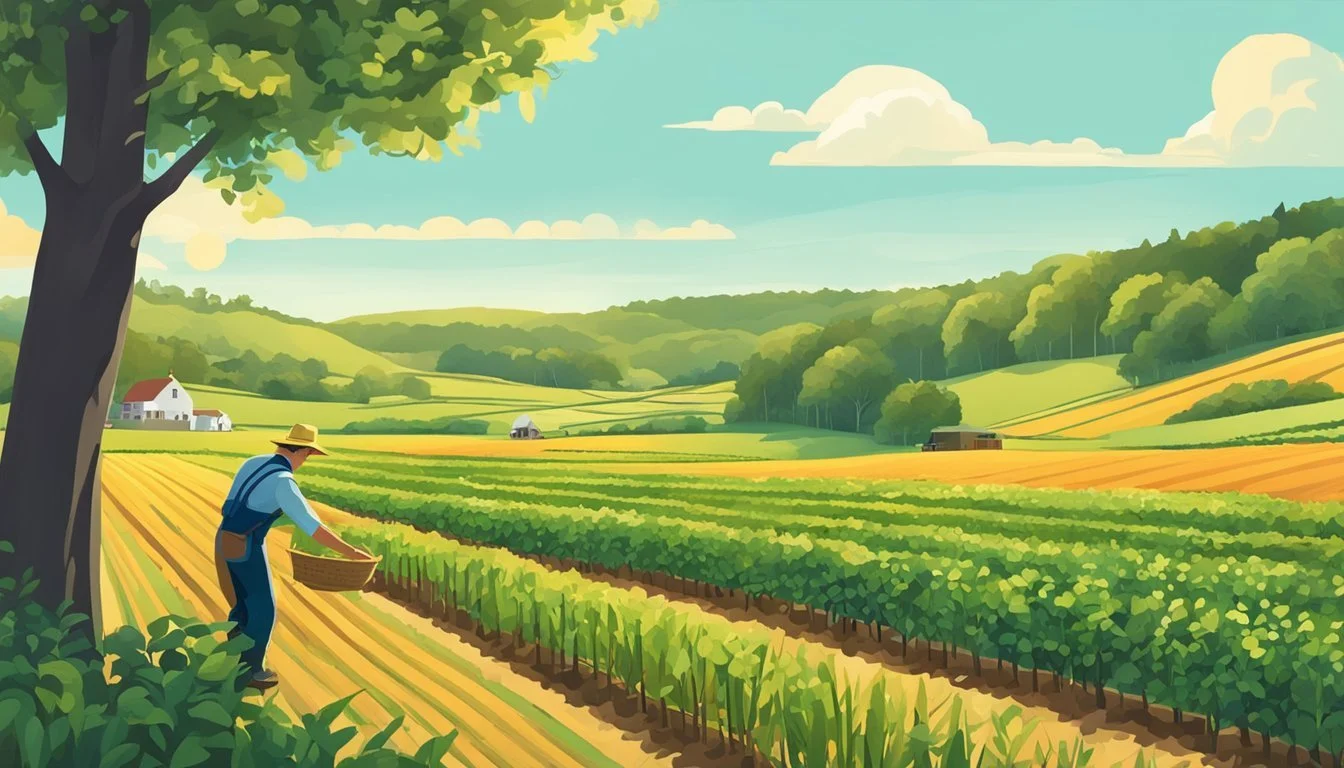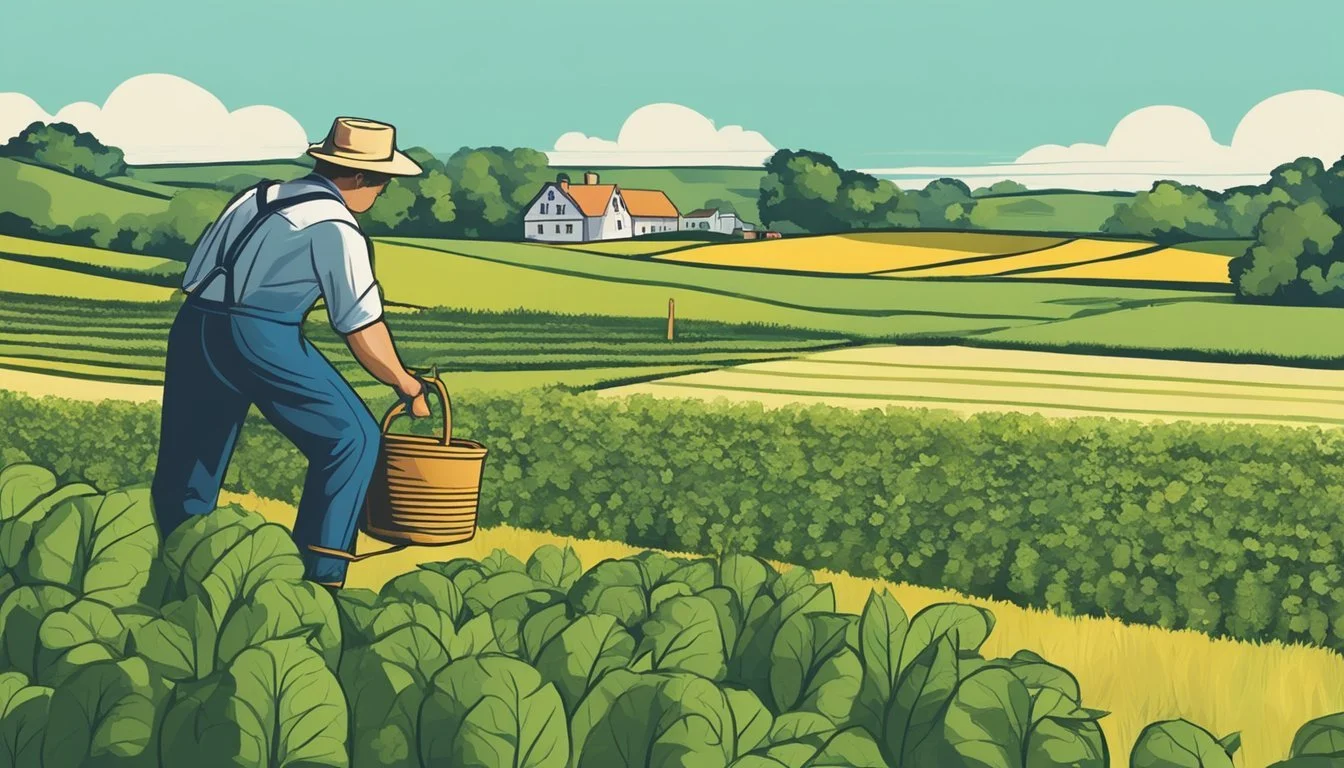

The Right to Farm Law in Rhode Island serves as a safeguard for agricultural operations, ensuring that the increasing urban sprawl does not unduly hinder farming activities. Enacted in 1982, this legislation acknowledges the importance of agriculture in the state's economy and cultural heritage. Amidst the tensions between expanding urban developments and traditional farming practices, the law articulates a clear policy in support of agriculture, aiming to protect existing and future farming operations from nuisance lawsuits that can arise when non-agricultural land uses extend into farming areas.
Rhode Island's commitment to agriculture is further underscored by the positive trend in the number of farms since the law's inception. Despite a reduction in the overall farmland area, the state has experienced a significant 51 percent increase in farm operations. This statistic suggests a resilient agricultural sector, adapting to changes in land use while maintaining its vital role in the state's landscape. The Right to Farm Law in Rhode Island reflects a deliberate legislative decision to favor agricultural continuity over unchecked urban development, reinforcing farmers' rights to undertake and expand their operations without undue interference.

The Right to Farm Law in Rhode Island was instituted as a legislative response to the challenges faced by agricultural practices amidst urban expansion. This section details the inception and subsequent modifications of this legislation.
In 1982, Rhode Island enacted the Right to Farm Act to shield agricultural operations from the increasing urbanization. The legislation is codified in R.I. Gen. Laws § 2-23-1. At the time, legislators recognized the need to support farms and agriculture that were being encroached upon by urban development. The law affirmed the state’s commitment to preserving its agricultural heritage and assets. The title "The Rhode Island Right to Farm Act" was formally established by P.L. 1982, ch. 10, § 1, underscoring the significance of agricultural activities in the state.
Over the years, the Right to Farm Law has evolved with amendments that reflect the changing landscape of agriculture and urban relationships. These changes have aimed to balance the interests of both agricultural and non-agricultural communities. While the law's core intention—to protect farming activities from nuisance lawsuits and zoning laws—remains unchanged, specific provisions have been adjusted to maintain relevance with contemporary issues facing Rhode Island's agricultural sector.

Rhode Island's Right to Farm Laws establish critical guidelines designed to safeguard the interests of farms and agricultural operations. These regulations serve as a shield for farmland against undue restrictions and promote agricultural sustainability within the state.
The primary aim of the Right to Farm laws is to protect existing and future agricultural operations from unwarranted nuisance claims and restrictive municipal ordinances. This legislation acknowledges the significance of agriculture to Rhode Island's economy and seeks to encourage the preservation and proper management of farmlands.
In Rhode Island, the legal framework governing the Right to Farm laws provides clarity and protection for agricultural operations amidst urban expansion. It ensures a balance between fostering agriculture and managing land use.
The foundational piece of legislation is known as "The Rhode Island Right to Farm Act." Enacted to support and protect viable agricultural operations against nuisance suits, it symbolizes a commitment to preserve farming as an essential activity within the state.
Rhode Island General Laws §§ 2-23-1 to 2-23-7 comprise the Right to Farm Act. These statutes define what constitutes an agricultural operation, outline the legislative findings, and articulate the policy that aims to safeguard farmers from nuisance lawsuits that could arise from normal farming operations.
Key sections within the Act include:
The Act interfaces closely with local zoning ordinances to shape land use across the state. Its provisions are designed to protect existing and future agricultural operations from being deemed nuisances, particularly as urban land encroaches upon traditionally rural areas. This often requires careful consideration of property rights and the compatibility of agricultural activities with neighboring land uses.

Rhode Island's Right to Farm Law encompasses various operational aspects which are crucial to the functioning of the state's agriculture. These aspects include guidelines and definitions pertaining to agricultural practices, the management of livestock, and the utilization of forestry resources for economic gain.
Agricultural operations in Rhode Island are defined as commercial endeavors where horticulture, viticulture, floriculture, or aquaculture serve as the primary purpose. This includes the cultivation of plants and flowers, grape growing, and the farming of aquatic organisms. Restrictions from nuisance actions are provided to these operations, provided they adhere to standard agricultural guidelines.
The management of livestock forms an essential part of agricultural operations. The term encompasses the raising of animals for fiber, production of dairy, poultry, or the stabling of horses. These practices are protected under the law to ensure that agricultural operations are not hindered by undue nuisance lawsuits, as long as standard farming practices are maintained.
Forestry operations, including the management and harvesting of forest products, fall under the jurisdiction of Rhode Island's Right to Farm Laws. These operations must be conducted in compliance with legal and regulatory standards to benefit from the protections against nuisance lawsuits. Forests serve not only as a source of timber and other products but as vital components of the state's agricultural landscape.

Rhode Island’s Right to Farm Law provides specific protections for agricultural operations against nuisance actions. These protections aim to maintain the value of agricultural land and the viability of farming activities in the face of urban encroachment.
Nuisance refers to an action or a condition that interferes with the use and enjoyment of property. It typically includes disturbances such as:
Agricultural operations, by nature, can create conditions that may be considered a nuisance in a more urban setting. Rhode Island's Right to Farm Law acknowledges that such conditions are often inherent to farming and provides a legal framework that identifies what does not constitute a legal nuisance in the context of agriculture.
Under the Rhode Island Right to Farm Act, there are key limitations on nuisance actions:
Protection against nuisance actions is essential to preserve the economic value of farms and agricultural production. These limitations ensure that farming practices can continue even as residential development encroaches on rural areas.
The Right to Farm Law in Rhode Island establishes a balance between farmers’ rights to conduct agricultural activities and community expectations. It aims to protect legal farming operations against nuisance lawsuits while ensuring compliance with environmental protection and local governance.
Farmers in Rhode Island are entitled to engage in agricultural operations, including the raising of livestock, protected by the Right to Farm laws. These statutes broadly prevent cities and towns from passing ordinances that would unduly restrict farming practices. The law shields farmers from nuisance actions, provided they adhere to generally accepted agricultural practices and are not negligent.
The law requires farmers to notify prospective property owners of the Right to Farm ordinance, fostering transparency in community relations. This ensures that new residents are aware of the existing agricultural activities and the rights of farmers to undertake them. Good community relations also involve farmers being considerate of their neighbors and operating in a way that minimizes conflicts.
Farmers must comply with state Department of Environmental Management (DEM) regulations, which oversee environmental aspects of farming operations. Environmental stewardship is a key responsibility under the Right to Farm laws, requiring farmers to manage resources sustainably and prevent environmental degradation. Although the Right to Farm offers protections, it does not absolve farmers from potential negligence actions, especially those related to pesticide use.
To ensure the growth and support of the agricultural sector in Rhode Island, specific resources and programs have been established. They provide assistance to those within the agricultural community, including dairy farmers, to navigate and abide by the Right to Farm laws.
The Rhode Island Department of Environmental Management (DEM) administrates state-assisted programs aimed at supporting the agricultural industry. One key initiative is the Farmland Access Program, which facilitates the matching of new and existing farmers with available farmland. This program operates under the following parameters:
Additionally, the DEM works to protect agricultural operations by enforcing Right to Farm laws that help shield farms from nuisance lawsuits, which could otherwise jeopardize their operation.
The state of Rhode Island recognizes the importance of education in fostering a thriving agricultural environment. As a part of supporting Right to Farm principles, various educational resources are allocated to aid farmers and communities in understanding their rights and responsibilities:
By investing in educational outreach, Rhode Island empowers farmers with knowledge about Right to Farm statutes, promoting informed decision-making and sustainable agricultural practices across the state.

The discussion surrounding the Right to Farm Law in Rhode Island encompasses the complexities of agricultural longevity amid expanding urbanization. It raises a critical debate on the reconciliation between farming activities and urban land use pressures.
In Rhode Island, the surge of urban land development poses a significant threat to traditional farming operations. The stats show that despite a 51 percent increase in the number of farm operations, there has been a 4 percent reduction in farmland. As urban expansion continues, farm operations must adapt, potentially altering historical practices to coexist with new urban neighbors.
The Rhode Island Right to Farm Act aims to secure agriculture while managing the relationship with encroaching urban environments. Provisions of the law emphasize safeguarding agricultural activities from nuisance complaints, which often arise from the conflict between agricultural operations and urban land uses. This balancing act necessitates that both parties' interests are weighed respectfully to maintain economic viability and community harmony.
Considering the ongoing urban encroachment, the state's agricultural future hinges on strategic policy-making and agriculture-friendly initiatives. The Right to Farm Act serves as a critical tool in this endeavor, promoting an agricultural environment that is shielded from undue constraints stemming from urbanization. Sustainable farming in Rhode Island will depend on continuous support and updates to the law to reflect the evolving landscapes of both farming and urban development.